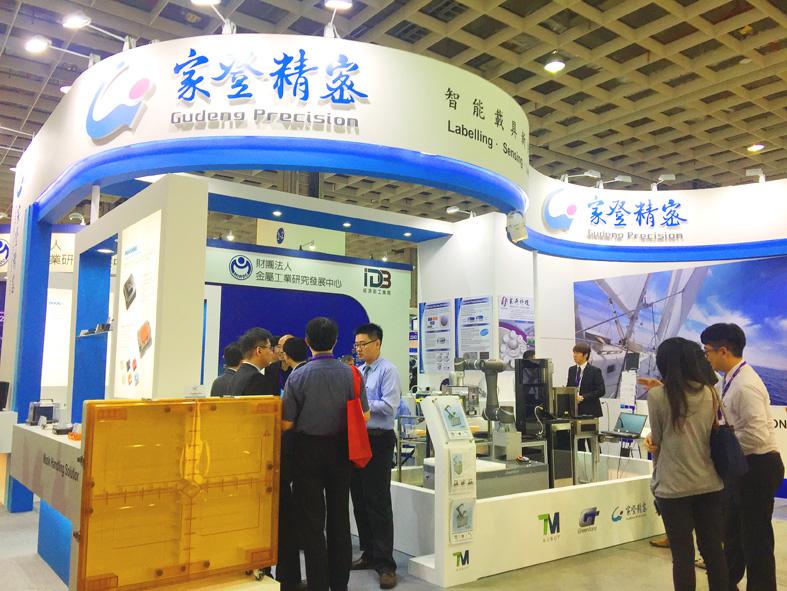Gudeng Precision Industrial Co (家登精密), the sole supplier of extreme ultraviolet (EUV) pods to Taiwan Semiconductor Manufacturing Co (TSMC, 台積電), yesterday said revenue surged 87.75 percent annually to NT$380 million (US$12.76 million) last month, benefiting from its largest buyers’ rapid migration to advanced technologies.
The surge boosted the company’s second-quarter revenue by 76.63 percent to NT$1.07 billion from NT$603.64 million in the same period last year. During the first six months, Gudegn has amassed NT$2.09 billion in revenue, soaring 67.54 percent year-on-year from NT$1.25 billion.
The company attributed the growth to its shipments of EUV pods in the first half of the year.

Photo: Grace Hung, Taipei Times
Gudeng said it has a clear order visibility through next year, adding that all of its front-opening unified pod (FOUP) manufacturing capacity is fully booked, with 70 percent ordered by customers in China.
The box-like FOUPs are used to ship, transport and store 12-inch wafers, which are unloaded from the FOUP within processing equipment to keep the wafers sterile. EUV pods are used to carry reticles when EUV tools are utilized to make chips with cutting-edge process technologies.
“The orders received have surpassed our capacity. The FOUP order visibility extends through to the end of next year,” Gudeng said in a statement.
“Due to supply constraints, some Chinese customers are offering to pay more to secure as much capacity for early delivery,” it said.
Gudeng, based in New Taipei City’s Tucheng District (土城), said EUV pods and FOUPs are two products that have experienced the fastest growth momentum.
With TSMC’s 3-nanometer technology to enter mass production in the second half of this year, Gudeng said it expects its shipments of EUV pods to grow significantly.
Strong customer demand is expected to boost financial performance, the company said, adding that net profit in the first half of this year should exceed last year’s earnings.
The company said it would release detailed results and a business outlook next month.

SECTOR LEADER: TSMC can increase capacity by as much as 20 percent or more in the advanced node part of the foundry market by 2030, an analyst said Taiwan Semiconductor Manufacturing Co (TSMC, 台積電) is expected to lead its peers in the advanced 2-nanometer process technology, despite competition from Samsung Electronics Co and Intel Corp, TrendForce Corp analyst Joanne Chiao (喬安) said. TSMC’s sophisticated products and its large production scale are expected to allow the company to continue dominating the global 2-nanometer process market this year, Chiao said. The world’s largest contract chipmaker is scheduled to begin mass production of chips made on the 2-nanometer process in its Hsinchu fab in the second half of this year. It would also hold a ceremony on Monday next week to

TECH CLUSTER: The US company’s new office is in the Shalun Smart Green Energy Science City, a new AI industry base and cybersecurity hub in southern Taiwan US chip designer Advanced Micro Devices Inc (AMD) yesterday launched an office in Tainan’s Gueiren District (歸仁), marking a significant milestone in the development of southern Taiwan’s artificial intelligence (AI) industry, the Tainan City Government said in a statement. AMD Taiwan general manager Vincent Chern (陳民皓) presided over the opening ceremony for the company’s new office at the Shalun Smart Green Energy Science City (沙崙智慧綠能科學城), a new AI industry base and cybersecurity hub in southern Taiwan. Facilities in the new office include an information processing center, and a research and development (R&D) center, the Tainan Economic Development Bureau said. The Ministry

ADVERSARIES: The new list includes 11 entities in China and one in Taiwan, which is a local branch of Chinese cloud computing firm Inspur Group The US added dozens of entities to a trade blacklist on Tuesday, the US Department of Commerce said, in part to disrupt Beijing’s artificial intelligence (AI) and advanced computing capabilities. The action affects 80 entities from countries including China, the United Arab Emirates and Iran, with the commerce department citing their “activities contrary to US national security and foreign policy.” Those added to the “entity list” are restricted from obtaining US items and technologies without government authorization. “We will not allow adversaries to exploit American technology to bolster their own militaries and threaten American lives,” US Secretary of Commerce Howard Lutnick said. The entities

Minister of Finance Chuang Tsui-yun (莊翠雲) yesterday told lawmakers that she “would not speculate,” but a “response plan” has been prepared in case Taiwan is targeted by US President Donald Trump’s reciprocal tariffs, which are to be announced on Wednesday next week. The Trump administration, including US Secretary of the Treasury Scott Bessent, has said that much of the proposed reciprocal tariffs would focus on the 15 countries that have the highest trade surpluses with the US. Bessent has referred to those countries as the “dirty 15,” but has not named them. Last year, Taiwan’s US$73.9 billion trade surplus with the US